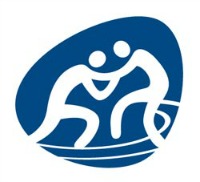 Wrestlers weigh in at the World University Championships
Wrestlers weigh in at the World University Championships Need more reason? How many in-shape former wrestlers do you see walking the mats after college? What number of them become binge eaters and drinkers? The post-collegiate wrestler is a consumer of any and all crap calories, often launching himself into a gorge-first diet in rebellion of the nights when he was deprived sustenance. That alone -- the bulging midsections of our former competitors (save Lee Kemp) -- should be indication enough that the same imbalanced system that exists within the developmental years has an outsized, waist-bursting effect as adults.
As if the physical side effects aren't prominent enough in our cauliflower-eared alumnus, ask them about their relationship with food. Look no further than Dan Gable, American wrestling's most-revered retiree, to see the soul-crushing effect a life spent battering yourself over calories can do to the mind.
From Wright Thompson's ESPN piece, "The Losses of Dan Gable" ...
His time in the wrestling room, and his quest to make sure the sport survived, helped control the storms he felt inside. Gable's life is governed by justification and guilt, as if he's forever paying off some unseen debt. He doesn't like to eat, for instance, without working out, constantly balancing a ledger in his mind. One day in March, he stared at a bowl of pasta, hungry and stubbornly trying not to eat. He'd skipped the gym and now looked longingly at the noodles.The unforeseen debt doesn't exist -- that's incorrect. Gable doesn't think he deserves it because he broke his mind's relationships with food when he was sweating out the weight of a third-grader every week for a decade. Cutting weight isn't a marketable skill, or masculine ideal. It's a method to gaining an edge over an opponent that isn't directly wrestling-based. It's lazy. Why drill more or lift more, eat better and train better, when you can just sit in a sauna?
"I don't deserve it," he said quietly.
That's not to say cutting weight is easy. It certainly tests a wrestler's mental toughness. I was as an emaciated stick figure in college and though I never missed weight I still have nightmares about a nondescript scale bounding past .0, on its way to .6 then .4.
I'm 32 years old -- ten years past my competition days -- and my wrestling career not only visits my dreaming subconscious, but has me avoiding scales like I would a popsicle salesman in Siberia.
How absolutely insane is it that as a grown man I look in the mirror and have serious, Dove-commercial body image problems? How many other wrestlers do you think feel the same way? How many look into the mirror and call themselves a fat slob even if they are one of the few keeping their weight in check? I'm willing to wager a year-supply of s'more-flavored Pop-Tarts that there are thousands of former wrestlers who cover their stomach with a pillow or blanket after a large meal. For athletes who are supposed to be the best-trained in the world, that should be an embarrassment anecdote on the health and nutrition habits we teach our athletes.
All hope isn't lost. Wrestling could become a nutrition leader within the world of youth sports. We could become the athletes known not for our ability to spit in a cup at the last minute, but for our year-round, lifelong commitment to the absolute best nutrition possible. The problem is that the NCAA, the NWCA, and any other body can't regulate the process. It needs to come from the community itself. We need to police our kids, and stop elevating weight cutting as an exemplar of toughness, and instead equate it to laziness. Make it negative, make it uncool and the kids will stop doing it.
I know there are some collegiate programs that are on the way to improving the diets of their athletes, but it's not enough and the mindset at the youth level isn't changing fast enough. The message is simple and clear: Don't cut weight. Don't binge diet. Don't use the sauna.
Do condition. Do eat healthy foods. Do drill technique.
Wrestling is the purest social sport known to man. It's basic, commonly practiced and when taught in the correct fashion, fun. Wrestling is the first and most-effective sport at creating a meaningful social bond, and it's also the basis for lifelong self-defense and confidence building. For many, wrestling is a lifestyle.
Cutting weight has nothing to do with the core values of our sport, and should be eliminated as part of that lifestyle.
Let's not sully the positive vision of our beloved sport with the obnoxious imagery of gaunt-faced high school kids wrapped in trash bags running around darkened gymnasiums. Wrestling should be stronger than to promote unhealthy living to achieve false gains and long-term losses.
To your questions ...
Q: I am probably late to the party on this, but I remember reading on Twitter a few weeks ago what appeared to be a spat between Ben Askren and Kyle Dake. Was this a legitimate beef with each other? What was it all based off? Is it still going? Do these guys legitimately not like each other?
-- Big Bob B.
Foley: The "spat" you mentioned was started after Ben Askren beat Quentin Wright at Agon I. To pump up future events and promote the brand, Askren chose to call out Dake. The four-time NCAA champion's defense was pretty stunning, saying in essence that he'd like to focus on his international career, and actually win, unlike Askren. Fun little Twitter tete-a-tete though I doubt there is any real animosity.
In terms of what it means for Agon, that is also unknown, though if they looked to gain some free publicity from the back-and-forth then it worked as planned.
Q: How closely do InterMat, Flowrestling, etc. work together to come out with the college and high school team and individual rankings? Are they usually in synch? Or do they differ?
-- Gregg Y.
Foley: Oh! Not at all, brother. At InterMat there is a collection of wrestling heads and a very advanced formula to help sort through the top wrestlers and teams. For Flo, I don't have the slightest.
Rankings vary widely and are often tough to nail down early in the season, but I think if you compare InterMat's rankings to its competitors you'll find a lot of consistency in logic and rankings that come closest to mirroring final results. Just guessing, but I have an obvious and unapologetic bias.
MULTIMEDIA HALFTIME
From the Whitewater Warhawks ... Heavy metal and spandex! (Good job)
Mike McMullan's Move of the Week
David Pearce's Move of the Week
Shameless plug: Steve Garland's Podcast
Traditional Costume Festival in Ulaanbaatar, Mongolia!

Q: How long until the NCAA sees an interview like the one GSP gave Saturday night?
-- Terry H.
Foley: When you see a wrestler come out of a match looking like this.
The NCAA's nightmare almost came true in 2012 when Ryan Flores of American faced Zack Rey of Lehigh in the NCAA semifinals and the former came away a stumbling mess, ostensibly from a concussion.
The Flores saga became backroom fodder for those who were concerned that the concussion crisis was going to seep into wrestling. The larger media powers ignored the event and wrestling avoided a PR nightmare, but if the situation repeats itself and a knowingly concussed wrestler takes the mat, what will be the cost to the sport of wrestling.
Like MMA, wrestling is a combat sport which lends mothers to already assume a base level of violence and injury risk. If wrestling is subject to an inquiry on par to that of football, it simply won't survive. Wrestling, like football, iwould die a quick death at the hands of worrisome mothers. (The reason football made it this long was the padding, which provided mothers an added layer of security that Tommy was going to be OK. We now know that the opposite is true.)
Wrestling needs to implement steadfast concussion rules and penalize coaches caught on film breaking those rules. Doctors should make the call as to whether or not the athlete can continue, not the coaches.
If you've wrestled, you've likely had a mild concussion. That doesn't mean you'll end up with blurred vision like GSP -- who was using his frontal lobe as a front line of defense against the lead-fisted strikes of Johny Hendricks -- but it does mean you should have sympathy and awareness of when it's happening an how to treat it.
Wrestling is a fun sport that if managed well can be perfectly healthy for participants. There is no reason to think our biggest stars will become mumbling ghosts of their former selves -- especially if they're being monitored closely by coaches and doctors.

-- Tony R.
Foley: I see what you're doing here. You want me to make reference to the leg, which if taken out of context could look phallic. I won't do that, but in responding, I think you've now made your point, and I agree.
The singlet is DEAD.
InterMat senior writer T.R. Foley answers reader questions about NCAA wrestling, international wrestling, recruiting, or anything loosely related to wrestling. Questions can be sent to Foley's email account or Twitter.
Do you want to read a past mailbag? Access archives.


You are 100% correct about weight cutting. After College wrestling was over, I gained about 80 pounds in less than a year. I have since lost the weight, compete as an ultra marathon runner and in BJJ. I walk around lighter than the weight I wrestled in college by training properly and eating right. However, I still have issues with the scale and with my body. We definitely have to do something about this. I believe that weight cutting is a very similar issue with participation as the singlet.
the ncaa and the nwca can, certainly, make it happen if they want weigh cutting to stop.
That being said, Mr. Foley I truly enjoy your Friday mailbag sir and look fwd to it every week. Ive got an idea for a story: how about a look back at the last 10 years at each of the highschoolers who received the award for best highschool wrestler and how their college careers turned out?
1. Explains the reasons why wrestlers choose to lose weight
2. Explains the methods wrestlers use to lose weight
3. Discusses the implications of cutting/not cutting weight in wrestling and success
4. The present weight management programs
5. How to properly lose weight for wrestling
6. How nutrition impacts wrestling and weight loss
7. Training for success in wrestling.
I wrote the book because of my issues regarding the way I cut my weight in high school and college. I nearly died from poor weight loss strategies in college in 1991. To take a look at the website for the book, please go to: www.happyvalues.com/ecomm/store.php?crn=220&rn=438&action=show_detail
I'm in the process of adding some updated material, including a wrestling mental skills training manual that I developed in one of my masters program courses in Sports Psychology. I'd like to find a publisher for a "hard copy" of the book...can anyone help? Email me at: headlock1145@gmail.com
Thanks!
We need to keep in mind that 1/3 of the US is obese and 2/3 are overweight. Yes, being in a weight control sport can have a serious, long-term drawbacks. But the statistical reality is we are going to see 1/3 of our teammates balloon in the the obese category. Oddly/strangely/ or maybe positively, they might be more aware of themselves than our generally fat population because they have seen how lean/fit they can be, but the reality is, more often than not, they will be gaining a lot of weight regardless of wrestling or not.
There are, by the way, quite a few few wrestlers who maintain an excellent, long-term healthy weight. In reality, we should look to see if wrestlers, on average, are beating the american average. I think they might be.